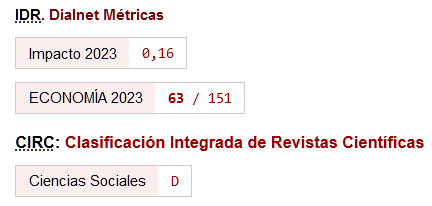Galbraith: the economist with a public purpose
Keywords:
role of Economicas and economists, GalbraithAbstract
In Economics, what is absolutely mysterious is probably unimportant, said John Kenneth Galbraith (1908-2006) on several occasions about the usual economic language in comparison to the terminology used by other social sciences. Nonetheless, the american economist warned that this statement didn´t excuse anyone from mastering the fundamental ideas and conceptual apparatus of the discipline. Author of the trilogy The Opulent Society (1958), The New Industrial State (1967) and The Economy and the Public Purpose (1973), which received wide recognition from critics and readers; editor of Fortune in the immediate postwar period; Counselor of the presidents Roosevelt, Truman, Kennedy and Johnson, as well as a successful columnist and writer, Galbraith fought what he called "conventional wisdom": the social acceptability of the principles of neoclassical economics. With this objective, the professor at Harvard University attracted a large audience with the purpose of imposing certain issues on economists. Galbraith estimated that if the postulates of "conventional wisdom" were vulnerable, unreal, citizen intuition would respond. Finally, Galbraith was a pioneer in the television broadcast of economic ideas and their consequences through the series that starred for the BBC The Age of Uncertainty (1977).
Downloads
References
Adams, John (1984): "Galbraith on economic development", Journal of Postkeynesian Economics, vol. 8, n. 1, pp. 91-102.
https://doi.org/10.1080/01603477.1984.11489485
Bradford deLong, J. (2005): "Sisifus as SocialDemocrat. The life and legacy of John Kenneth Galbraith", Foreign Affairs, vol. 84, n. 3, pp. 126-130.
https://doi.org/10.2307/20034355
Breit, William (1984): "Galbraith and Friedman: two versions of economic reality", Journal of Postkeynesian Economics, vol. 8, n. 1, pp.18-29.
https://doi.org/10.1080/01603477.1984.11489480
Burgin, Angus (2013): "Age of certainty: Galbraith, Friedman, and the public life of economic ideas", History of Political Economy, vol. 45, n. 1, pp. 191-219.
https://doi.org/10.1215/00182702-2310998
Chirat, Alexandre (2018): "When Galbraith frightened conservatives: Power in Economics, Economists' Power, and Scientifity", Journal of Economic Issues, vol. 52, n. 1, pp. 31-56.
https://doi.org/10.1080/00213624.2018.1430940
Dunn, Stephen (2005): "John Kenneth Galbraith and the Multinational Corporation", Challenge, vol. 48, n. 2, pp. 90-112.
https://doi.org/10.1080/05775132.2005.11034286
Dunn, Stephen (2011): The Economics of John Kenneth Galbraith. Introduction, Persuasion, and Rehabilitation, Nueva York: Cambridge University Press.
https://doi.org/10.1017/CBO9780511778094
Dunn, Stephen P. y Pressman, Steven (2007): "The lasting economic contribution of John Kenneth Galbraith, 1908-2006", Journal of Post Keynesian Economics, vol. 29, n. 2, pp.179-190.
https://doi.org/10.2753/PKE0160-3477290201
Friedman, Milton (1977): Friedman on Galbraith, Londres: Institute of Economic Affairs, Londres.
Friedman, Milton (1979): Libertad de elegir. Barcelona: Orbis, 1983
Galbraith, John Kenneth (1955): La economía y el arte de la controversia. Barcelona: Ariel, 1960.
Galbraith, John Kenneth (1958): La sociedad opulenta. Barcelona: Ariel, 2008.
Galbraith John Kenneth (1971): Economía y subversión. Barcelona: Plaza y Janés, 1972.
Galbraith John Kenneth (1974): "El poder y el economista útil", El Trimestre Económico, n. 161, pp. 231-247.
Galbraith, John Kenneth (1973): La economía y el objetivo público. Barcelona: Plaza y Janés, 1975.
Galbraith, John Kenneth (1977): La era de la incertidumbre. Barcelona: Plaza y Janés, 1981.
Galbraith, John Kenneth (1981): Memorias. Una vida de nuestro tiempo. Barcelona: Grijalbo, 1982.
Galbraith, John Kenneth (2002): "Thorstein Veblen y la teoría de la clase ociosa", Introducción a Veblen, Thorstein [1944]: Teoría de la clase ociosa, México: Fondo de Cultura Económica.
Heilbroner, Robert L. (1972): Entre capitalismo y socialismo, Madrid: Alianza Editorial.
Holt, Richard P.F. (2017): The selected letters of John Kenneth Galbraith, Nueva York: Cambridge University Press.
https://doi.org/10.1017/9781139095853
Parker, Richard (2005): John Kenneth Galbraith: his life, his politics, his economics, Nueva York: Farrar, Straus and Giroux.
Parker, Richard (2004): "The legacy of John Kenneth Galbraith", Challenge, vol. 47, n. 2, pp. 81-89.
https://doi.org/10.1080/05775132.2004.11034238
Seligman, Ben B. (1962): Principales Corrientes de la ciencia económica moderna. Barcelona: Oikos-Tau, 1967.
Stanfield, James Ronald y Jacqueline Bloom Stanfield (2011): John Kenneth Galbraith, Palgrave Macmillan, Basingstoke, Reino Unido.
Downloads
Published
How to Cite
Issue
Section
License
This licence allows third parties to share (copy and redistribute the material in any medium or format) and adapt (remix, transform and create from the material for any purpose, including commercial purposes), provided that authorship and first publication in this journal (The Journal, DOI of the work) is acknowledged, a link to the licence is provided, and it is stated whether changes have been made to the work.







